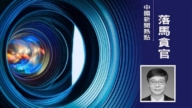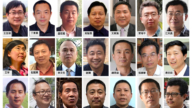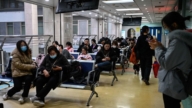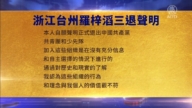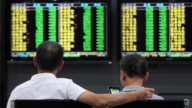【新唐人2014年10月23日訊】中國大陸的各大媒體,目前正開足馬力宣傳中共四中全會,和「依法治國」的主題。同時引人注目的另一件大事,則是一國之內的香港,持續三週多的「佔領中環」活動。黨媒對於這場學生公民運動,發出要「維護香港的法治」的論調。這是否為北京提倡的「依法治國」作出最新的詮釋?一起來看看。
《人民網》週二說,各方都在關注中國的法治建設。中共總書記習近平的法治觀就是:奉法者強則國強。
那麼,依法治國是依甚麼法?連日來,不少專家和學者認為,一切都應該依照「憲法」而行,因為它是一國大法和母法。
不過,「憲法」豐滿,現實骨感。中國「憲法」賦予公民的權利,長期以來被外界認為,沒有得到具體落實。
《南德意志報》21號一篇題為「有意作假」的文章寫道:所有跡象顯示,這裏指的「依法治國」又是另一種詮釋的可能:「法律輔助下的統治」。文章認為,中共完全不想要西方典範的獨立司法,歸根結底,中共想要的其實是高效的法庭,一種預防社會不滿、讓統治和管控變得更容易的法庭。
北京大學刑法學博士劉四新:「依法治國,它治誰?是治民?治社會?還是治官,還是治公權力?這個需要明確。而傳統法治的第一個要旨就是用法律來制約公權力,制約政府,制約執政者。毫無疑問,它這個依法治國的理念,首當其衝的還是作為維護現有格局的一種工具,而不是完全意義上的法治。」
具體到當下香港學生的公民運動,港府和學聯週二的對話,並未達成實質性的成果。學聯表示,政府只是敷衍示威者。學聯秘書長周永康形容,人大就政改的決定,「就如閹割民主路,令港人爭取民主落空。」
港府和學生對話期間,有網友說,大陸正是沒能在依憲治國,所以無法在香港依法治國。
時事評論員邢天行表示,真正的依法治國,是跟民主密切聯繫的。如果沒有一個民主機制,法律不能獨立,就根本不可能達到所謂的依法治國。
時事評論員邢天行:「從香港這個問題上就看的非常清楚了。香港社會它本身承繼的是一個民主、司法的體制,中共它自己的承諾它都不可能去讓香港人真正得到他應有的權利。所以它要把它法律這種制度給改變了,讓它向大陸看齊。所以它怎麼可能去實現這個依法治國呢?它那個都是一個笑話。」
中國憲法35條規定:中國公民有言論、出版、集會、結社、遊行、示威的自由。
不過, 黨媒《人民日報》曾在近期宣稱,應該「維護香港的法治」,言外之意,被外界解讀為當局要求香港學生們,馬上終止這個運動。而發出類似強烈批判信號的,還有多家黨媒。
時事評論員邢天行:「它所謂的依法治國,在它的眼裏就是統治人民,怎麼讓人民去聽話,它就不是按照法律去走。中共它向來都是這樣,它不會說顧及到它自己說法上這種謊言。它會不斷的用一些漂亮的詞,去打造它自己的那些政策。這也是它愚民統治的一個手段嘛。」
週二,《法蘭克福匯報》也關注了北京在香港「佔中」運動上的戰略。文章表示:APEC峰會即將拉開帷幕,剛在四中全會上提出要全面「依法治國」的中共領導深知,在當下這個時間點,不尊重國際條約--例如針對97年香港回歸的《中英聯合聲明》,會令形象格外負面。
所以在香港,北京領導層採取了在中國其他地方早已多次用過的策略:即讓抗議達到一定程度時,讓其分裂分化。其中也包括宣稱,香港抗議者背後是「境外勢力的操控」和「分裂勢力」等。
中國政法大學副校長馬懷德日前指出:依法治國,人民不會只看到制定了多少法律,更看你落實了多少。
採訪/陳漢 編輯/王子琦 後製/陳建銘
A reflection on Beijing’s “rule of law”
from Hong Kong’s Occupy Central.
Mainstream media in China is currently publicizing
the CCP’s Fourth Plenary Session and the idea of “rule of law”
with full attention and energy.
Another topic that has grabbed everybody’s attention
is the “Occupy Central” movement that has lasted for
more than 3 weeks thus far.
With regard to this student campaign, party media in China
called for the protection of “Hong Kong’s rule of law”.
Is this the latest interpretation of the heavily promoted
“rule of law” in Beijing? Let us take a look.
On Tuesday, “People.com” said that parties from all sides are
paying attention to the construction of China’s rule of law.
CCP general secretary Xi Jinping said on the rule of law,
“A country is strong when it has a strong adherence to law.”
But what is the law within the rule of law?
Many experts and scholars believe that
everything should follow the Chinese “Constitution”
because it is the mother of all laws in China.
However, the “Constitution”, for all its magnificent
appearance, is impoverished in reality.
For a long time, observers and commentators believe that
the people’s rights granted under the Chinese constitution
have not been respected.
Germany’s “Sueddeutsche” Chinese published an article
on the 21st titled “Intentional Fraud”, according to
Deutsche Welle (DW) Chinese online report.
It wrote that all signs show another interpretation
for the CCP advocated “rule of law”.
The writer believes that the CCP is not looking for
an independent judiciary that is the essence of rule of law
in the west.
Instead, what CCP wants is an effective court, one that
can quell social discontent and make ruling
and controlling much easier.
Criminal law professor of Peking University, Liu Sixin said,
“Rule of law, but who is it trying to rule? The people?
Society? Officials? Or the public powers? This must be clear.
The first principle of the traditional rule of law is to use law
to constrain power, to constrain the government
and the rulers.
No doubt, CCP’s rule of law is a tool to maintain
the status quo, not the rule of law in its complete
and ordinary sense. ”
Looking specifically at the citizens’ movement organized
by Hong Kong students, the dialogue between
Hong Kong government and the federation of students
has not seen any concrete results.
The student federation states that the government
is only trying to placate the protestors.
Federation secretary-general Alex Chow
described the Congress’ decision on political reform as
something that “castrates the democratic road and
frustrates the Hong Kong people’s pursuit for democracy”.
During the period of dialogue, some netizens said that
mainland China could not implement the rule of law
in Hong Kong because they were unable to implement
their own constitution at home.
Current affairs commentator Xing Tianxing said that
the true rule of law has an intimate relationship
with democracy.
Without a democratic system, the judiciary cannot achieve
independence, and the rule of law will just be
an impossible dream.
Xing Tianxing, “We can already see very clearly from the
issue of Hong Kong.
Hong Kong society inherited a democratic and legal system.
The CCP could not give Hong Kong their entitled rights
even when this is what they promised.
It wants to change the rule of law system in Hong Kong
to achieve uniformity with the mainland.
Under such circumstances, how can it possibly achieve
rule of law? This is a joke.”
Article 35 of China’s Constitution states that citizens of PRC
enjoy freedom of speech, of the press, of assembly,
of association, of procession and of demonstration.
Party media “People’s Daily” said recently that China should
“maintain the rule of law in Hong Kong”.
This has been interpreted by the outside world to mean
that the authorities demand the Hong Kong students
to immediately end this movement.
There are many other party media that sent out
similar messages of criticism.
Xing Tianxing, “It’s so called rule of law is to rule the people.
How to make the people obey? It simply does not
follow the law. This is the CCP style.
It will not hesitate to use subterfuge and lies.
It will continuously use seductive words to implement
its own policies. This is how it governs and rules.”
On Tuesday, “Frankfurter Allgemeine Zeitung”
noted Beijing’s strategy in dealing with Hong Kong’s
“Occupy Central”, according to DW Chinese online report
The article stated, “APEC summit is drawing near.
The CCP leaders who recently proposed “rule of law”
during the Fourth Plenary Session understood
that at this critical moment,
repudiating international treaties, such as the
Sino-UK Joint Declaration pertaining to Hong Kong,
will cast a very negative light on its image.”
Therefore, with regard to Hong Kong, leaders in Beijing
adopted a strategy that it has often used in
other parts of China –
let the protest brew to a certain extent before alienating it
from the rest of the society.
As part of this strategy, it labelled the protesters
in Hong Kong as “puppets of foreign powers”
and “separatist forces”.
Deputy principal of China University of Political Science and
Law, Ma Huaide stated, “Under the rule of law, the people
will not only look at how many laws you have enacted,
but also how many laws you have actually implemented.”
Interview/ChenHan Edit/WangZiqi Post-Production/Chen Jianming


